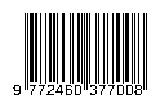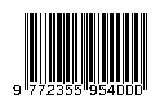Pengaruh Experiential Marketing Terhadap Kepuasan Pengguna Smartphone Blackberry Curve (Studi Pada Mahasiswa Fakultas Ekonomi Universitas Trunojoyo Madura)
Abstract
Full Text:
PDF (Bahasa Indonesia)References
Arikunto, Suharsimi. 2006, Prosedur penelitian suatu pendekatan praktik edisi revisi IV. Jakarta : PT Rineka cipta. Ghozali, Imam. 2006. Analisis Multivariate Lanjutan Dengan Program SPSS. Semarang : Badan Penerbit Universitas Diponegoro. Kartajaya, Hermawan. 2002. Hermawan Kartajaya on Marketing.Jakarta : Gramedia Pustaka Utama. Kustini. 2007. Penerapan Experiential Marketing Jurnal Riset Ekonomi dan Bisnis Vol. 7 No. 2. Kusumawati, Andriani.2011. Analisis Pengaruh Experiential Marketing Terhadap Kepuasan Dan Loyalitas Pelanggan: Kasus Hypermart Malang Town Square (MATOS). Jurnal Manajemen Pemasaran Modern Vol. 3 No.1. Rini, Sulistya Endang. 2009. Menciptakan Pengalaman Konsumen Dengan Experiential Marketing. Jurnal Manajemen Bisnis, Vol.2, No.1, Hal.15-20. Suryawan, Sheehan dan Dharmayanti, Diah. 2013. Analisa Hubungan Antara Experential Marketing, Customer Satisfaction Dan Customer Loyalty Cafe Nona Manis Grand City Mall Surabaya . Jurnal Manajemen Pemasaran Vol. 1, No. 2, (2013) 1-10. Sugiyono. 2012. Metode Penelitian Kuantitatif, Kualitatif dan R&D. Cetakan ke-17. Bandung : Alfabeta. Tjiptono, Fandy. 2005. Pemasaran Jasa. Banyu Media : Malang. http://www.aneahira.com, diakses 01 Desember 2013. http://www.businessweek.com/articles/2012-12-06/indonesians-still-love-their blackberrys, diakses 2 september 2013. http://www.kompasiana.com/, diakses 01 Desember 2013.
DOI: https://doi.org/10.21107/jsmb.v1i1.1513
Refbacks
- There are currently no refbacks.
Copyright (c) 2016 Samsul Bahri, Bambang Setiyo Pambudi, - Fathor A.S

This work is licensed under a Creative Commons Attribution 4.0 International License.

Jurnal Studi Manajemen dan Bisnis by Universitas Trunojoyo Madura is licensed under a Creative Commons Attribution 4.0 International License.







